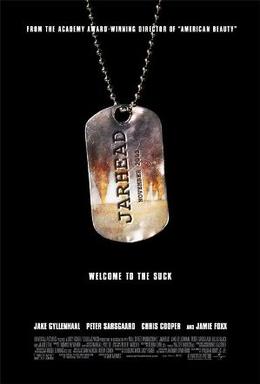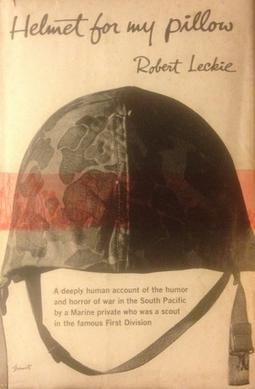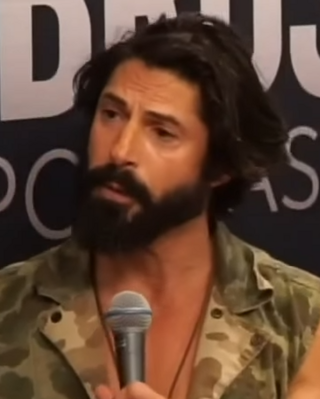
Band of Brothers is a 2001 American war drama miniseries based on historian Stephen E. Ambrose's 1992 non-fiction book of the same name. It was created by Steven Spielberg and Tom Hanks, who also served as executive producers, and who had collaborated on the 1998 World War II film Saving Private Ryan. Episodes first aired on HBO starting on September 9, 2001. Critically acclaimed, the series won the Emmy and Golden Globe awards for best miniseries.
The autokinetic effect is a phenomenon of visual perception in which a stationary, small point of light in an otherwise dark or featureless environment appears to move. It was first recorded in 1799 by Alexander von Humboldt who observed illusory movement of a star in a dark sky, although he believed the movement was real. It is presumed to occur because motion perception is always relative to some reference point, and in darkness or in a featureless environment there is no reference point, so the position of the single point is undefined. The direction of the movements does not appear to be correlated with involuntary eye movements, but may be determined by errors between eye position and that specified by efference copy of the movement signals sent to the extraocular muscles. Richard Gregory suggested that, with lack of peripheral information, eye movements which correct movements due to muscle fatigue are wrongly interpreted as movement of the perceived light.

The Second Battle of Fallujah, initially codenamed Operation Phantom Fury,Operation al-Fajr was an American-led offensive of the Iraq War that lasted roughly six weeks, starting 7 November 2004. Marking the highest point of the conflict against the Iraqi insurgency, it was a joint military effort carried out by the United States, the Iraqi Interim Government, and the United Kingdom. Within the city of Fallujah, the coalition was led by the U.S. Marine Corps and U.S. Army, the battle was later described as "some of the heaviest urban combat U.S. military have been involved in since the Battle of Huế City in Vietnam in 1968".

Dale Adam Dye Jr. is an American actor, technical advisor, radio personality and writer. A decorated Marine veteran of the Vietnam War, Dye is the founder and head of Warriors, Inc., a technical advisory company specializing in portraying realistic military action in Hollywood films. Dye has also offered his expertise to television, such as the HBO miniseries Band of Brothers and The Pacific, and video games, including the Medal of Honor series.

Jarhead is a 2005 American biographical war drama film based on the 2003 memoir of the same name by Anthony Swofford, chronicling his military service in the U.S. Marine Corps during the Persian Gulf War. Directed by Sam Mendes, the film stars Jake Gyllenhaal as Swofford with Jamie Foxx, Peter Sarsgaard, Lucas Black, and Chris Cooper.

1st Reconnaissance Battalion is a reconnaissance battalion in the United States Marine Corps. It is a stand-alone battalion with no parent regiment. Instead, it falls directly under the command of the 1st Marine Division. 1st Recon Bn is located at Marine Corps Base Camp Pendleton in San Diego, California.

Nathaniel C. Fick is an American diplomat, technology executive, author, and former United States Marine Corps officer. He was the CEO of cybersecurity software company Endgame, Inc., then worked for Elastic NV after it acquired Endgame. He was an Operating Partner at Bessemer Venture Partners. In 2022, he was selected to lead the U.S. State Department's Bureau for Cyberspace and Digital Policy.
The 2003 invasion of Iraq, which lasted from March 20 to May 1, 2003, resulted in a small number of U.S. and Coalition Prisoners of war.

The Pacific is a 2010 American war drama miniseries produced by HBO, Playtone, and DreamWorks that premiered in the United States on March 14, 2010.
Generation Kill is an American seven-part television miniseries produced for HBO that aired from July 13 to August 24, 2008. It is based on Evan Wright's 2004 book Generation Kill, about his experience as an embedded reporter with the US Marine Corps' 1st Reconnaissance Battalion during the 2003 invasion of Iraq, and was adapted for television by David Simon, Ed Burns, and Wright. The miniseries was directed by Susanna White and Simon Cellan Jones and produced by Andrea Calderwood. The ensemble cast includes Alexander Skarsgård as Sergeant Brad "Iceman" Colbert, Jon Huertas as Sergeant Tony "Poke" Espera, James Ransone as Corporal Josh Ray Person, and Lee Tergesen as Wright.

Helmet for My Pillow is the personal narrative written by World War II United States Marine Corps veteran, author, and military historian Robert Leckie. First published in 1957, the story begins with Leckie's enlisting in the United States Marines shortly after the 1941 attack on Pearl Harbor.
Evan Alan Wright is an American writer, known for his extensive reporting on subcultures for Rolling Stone and Vanity Fair. He is best known for his book on the Iraq War, Generation Kill (2004). He also wrote an exposé about a top CIA officer who allegedly worked as a Mafia hitman, How to Get Away With Murder in America (2012).
Benjamin B. Busch is an American actor, writer, film maker, photographer, and United States Marine Corps Reserve officer. He is best known for his portrayal of Anthony Colicchio on the HBO original series The Wire.

Brad Colbert is a retired United States Marine, whose platoon's role in the 2003 invasion of Iraq was featured in a series of articles in Rolling Stone by Evan Wright. Wright was an embedded reporter who rode in the backseat of Colbert's vehicle during this time until his departure on May 4, 2003. Wright later expanded these articles into the book Generation Kill which was turned into a HBO miniseries of the same name in which Colbert was portrayed by Alexander Skarsgård.

The Marine Raider Regiment (MRR), formerly known as the Marine Special Operations Regiment (MSOR), is a special operations force of the United States Marine Corps, which is a part of Marine Corps Special Operations Command (MARSOC). Renamed for its predecessor, the World War II Marine Raiders, this unit is the principal combat component of MARSOC, which is the Marine Corps' contribution to the United States Special Operations Command (USSOCOM).

Romus Valton "R.V." Burgin was a United States Marine and American author. As a young man, he served in the Pacific Theater during World War II.
Charles William Tatum was an American World War II veteran, Bronze Star recipient, race car driver and builder. On 19 February 1945, he was among the first wave of marines to land on the Japanese island stronghold of Iwo Jima. He was a friend of John Basilone.

Hella Nation: Looking for Happy Meals in Kandahar, Rocking the Side Pipe, Wingnut's War against The Gap, and Other Adventures with the Totally Lost Tribes of America is a 2009 book written by journalist Evan Wright who previously wrote Generation Kill.

Rodolfo "Rudy" Reyes is an American conservationist, martial arts instructor, actor, and former active duty United States Marine. He is best known for portraying himself in the HBO TV miniseries Generation Kill.














